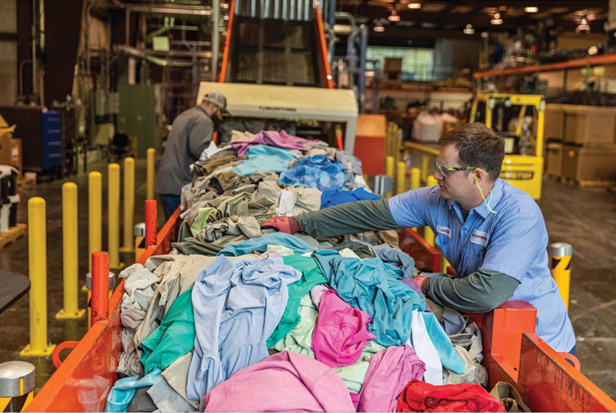Sustainability April 29, 2024
New Partnership Works To Advance Circular Fashion
Eastman, a Tennessee-based materials company, will partner with Debrand, which leverages molecular technology to recycle waste, to “close the loop on textiles.”
One man’s trash may be the same man’s treasure, at least in the case of this materials company.
Eastman is partnering with sustainable waste solutions company Debrand to recycle 5,000 pounds of apparel waste, according to a press release this month. The duo will utilize molecular science to break down textiles into Eastman’s trademark “Naia” cellulosic fibers.

Eastman has partnered with sustainable waste solutions company Debrand to recycle 5,000 pounds of apparel waste.
“Partnering with Debrand allows us to drive progress on our Naia sustainability goals, particularly to mainstream circularity by creating sustainable solutions for textiles that have reached end of life and turning them into valuable resources for new Naia Renew fibers,” said Claudia de Witte, Eastman textiles sustainability leader.
The effort comes as part of Eastman’s motivation to “close the loop on textiles,” according to the release. The Tennessee-based company previously worked with sustainability-focused outfitter Patagonia to recycle 8,000 pounds of clothing waste. This partnership also involved the molecular breakdown of apparel, which Eastman pledged to use in making new fibers.
This month’s partnership, however, specifies the recycled materials will be used for Naia Renew fibers: 40% of the fibers will be made from the recycled waste and the rest from “sustainably sourced” wood pulp. Eastman offers two iterations of its Naia fiber: one (Naia) produced solely from “sustainably managed” pine and eucalyptus wood pulp and the other (Naia Renew) from pulp and recycled waste. Both are used for textile production.
Eastman and Debrand leaders expressed a desire for the project to serve as an important stepping stone in sustainability for the textile and fashion industry at large.
“We took on this project with an intentional and iterative approach that would reach meaningful milestones,” said Lina G. Londono, Debrand’s vice president of sustainability. “This project was designed to offer scalability and accessibility for other brands that would want to participate in the future.”
Headquartered in Canada with facilities across the United States, Debrand has previously partnered with apparel brands such as Aritzia, Canada Goose and lululemon to develop eco-conscious waste solutions. To commemorate Earth Day last Monday, lululemon released an anorak jacket made from “enzymatically recycled polyester,” which it priced at $188.
Recently, circular fashion has seen its fair share of setbacks and leaps forward. Like lululemon, Athleta and H&M announced they would be integrating recycled polyester into their apparel. But despite backing from brands like H&M and Zara, the producer of recycled viscose material “Circulose,” Swedish company Renewcell, announced it filed for bankruptcy last month.
Still, Eastman’s partnership with Debrand marks a push by one of the leading materials companies in the world for a sustainable future.
“This collaboration underscores our commitment to work closely with key collectors and sorters to drive the necessary infrastructure changes for advancing sustainability in the fashion industry,” de Witte said.

Promo for the Planet is your destination for the latest news, biggest trends and best ideas to help build a more sustainable and socially-responsible industry.
